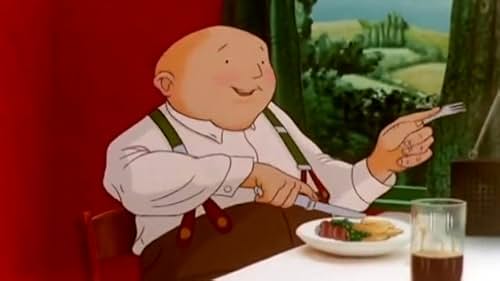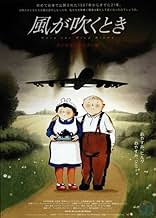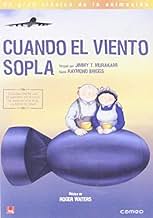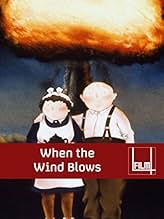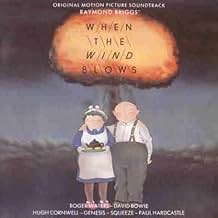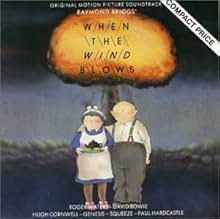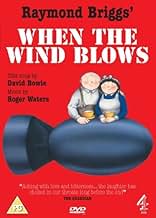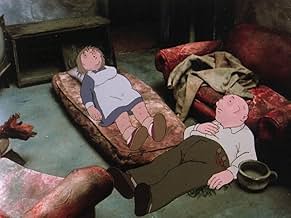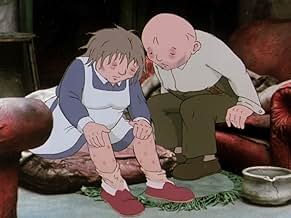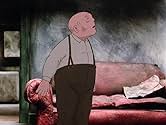Un'ingenua coppia di anziani cerca di sopravvivere al fallout di un'esplosione atomica.Un'ingenua coppia di anziani cerca di sopravvivere al fallout di un'esplosione atomica.Un'ingenua coppia di anziani cerca di sopravvivere al fallout di un'esplosione atomica.
- Premi
- 1 candidatura in totale
- Jim Bloggs
- (voce)
- Announcer
- (voce)
- Self
- (filmato d'archivio)
- (non citato nei titoli originali)
- Self
- (filmato d'archivio)
- (non citato nei titoli originali)
- Self
- (filmato d'archivio)
- (non citato nei titoli originali)
- Self
- (filmato d'archivio)
- (non citato nei titoli originali)
Recensioni in evidenza
This film takes a different approach: the format (animated) and the setting (rural England) perfectly match the soothing government messages: build a shelter, keep some food and drink - you'll be alright.
But then the story is continued through to the (very painful) end: there is no more government, there is no more mailman, there is
no more you....
John Mills is superb as the male character, his voice carries the echoes of his former glories as hero, officer type and all round good guy. With lavish casting, animation and soundtrack the plot is given a painful intensity.
Instead my family were treated to horror of the worst kind. A horror that deals with ordinary comfortable society. The two lovely elderly characters are my grandparents, my neighbours. We see them crumble and disintegrate in the nuclear aftermath. They prepare cheerfully for a nuclear war and wait helplessly in the fallout for a rescue which will never come.
Don't watch it with your parents, you will cry and be reminded about it for years afterwards.
Even if you're a hardcore war endorser, you simply couldn't be human if you didn't, at any point, feel the slightest pang of conscience for the two characters stuck in the middle of this one. Jim and Hilda are an elderly couple living a tranquil life in a small cottage out in the countryside they embody just about the most benign and peaceful kind of civilian you could imagine. Yet they are doomed to suffer the most for something over which they have no voice. They place their trust in a line of government-issued pamphlets and, in spite of the obvious flaws and contradictions in their advice, manage to construct a shelter that will stand up to the bombing. And, miraculously, it works but it leaves them totally unprepared for a threat even more horrifying, devastating and noxious than the blast itself; the nuclear winter, or 'fallout', that must follow.
When Raymond Briggs first set out to tell this incredible and nerve-jangling story, he chose to do it in one of the most unlikely formats available; a children's comic book. To some extent, something *is* lost in translating the original story to film it's a faithful adaptation, and really maintains Briggs' look, feel and sense of character (he himself had quite a big finger in this pie), but in merely being a movie it lacks the naïve innocence that only a children's storybook could really provide. The advantage it does have, however, is the chance to delve into his sketching style and produce some quality animation, a challenge it rises to well there are some brief interludes throughout the story which feature beautiful, even mesmerising artwork, serving up a sharp contrast to the painful reality our heroes are facing. The background score is entrancing, and the lyrics of Roger Waters' end-credits number just demand to be listened to. John Mills and Peggy Ashcroft were the *perfect* selections for the voices of Jim and Hilda. And, like the original source material, it makes brilliant use of understatement to paint a bigger, much more ghastly picture. Hard though it may seem, this is a film that really demands multiple viewings, as so many things are left to us, the viewers, to suss out for ourselves.
Final note stay right until the *very* end of the closing credits. This experience just isn't complete without hearing that chilling beeping as it fades.
While Mick Jackson's telemovie Threads remains the screen's most potent account of mass panic on apocalypse day, this British to-the-frame adaptation of Raymond Briggs' graphic novella is unquestionably the most humane. Say hello and wave goodbye then, to Jim and Hilda, our naive retired home counties couple who, on hearing of an imminent World War III, set about merrily obeying the ridiculous instructions from government protect and survive pamphlets. They whitewash the windows (to shield the radiation), stock up on supplies (a tin of Christmas pudding) and cheerfully anticipate a Blitz-style cosy-up sipping Olvaltine under Anderson shelters.
At first, it plays out like a black comedy - just as the bomb hits, dim Hilda goes to get the washing in - but as the insidious crackle of fall-out settles and the sickness sets in, the movie reveals its true nature: an unbearably intimate, gently accentuated tragedy with a tenacious pacifist streak. Blending 2D cells with 3D modelling, director Jimmy Murakami is technically adventurous but crucially, his connection to Briggs' material is total. In fact, with its working class nuances, droll dialogue and mundane aura , you sense that if Mike Leigh made cartoons, the results wouldn't be too far from this.
Lo sapevi?
- QuizDavid Bowie was originally slated to record several songs for the film but was only able to contribute the title song due to time constraints regarding his then-upcoming album "Never Let Me Down". Roger Waters contributed to most of the film's songs instead.
- BlooperAt the beginning of the scene in which Jim and Hilda are bedridden, Hilda's feet are missing for a few frames as the camera pans across.
- Citazioni
[dying of radiation poisoning]
Hilda: Shall we... pray, dear?
Jim: Pray?
Hilda: Yes.
Jim: All right then... But... to who?
Hilda: God, of course.
Jim: Oh, oh, oh, I see... Yes, yes... Would that be the correct thing?
Hilda: It can't do any harm, dear.
Jim: Ok, um... Here it goes... Dear sir...
Hilda: No, that's wrong, dear.
Jim: Well, uh... How, how do you start?
Hilda: Our God...
Jim: -our help, in ages past...
Hilda: That's it, dear. Keep it up.
Jim: Almighty and most merciful father...
Hilda: That's good.
Jim: Dearly beloved... we are gathered... unto thee. I shall fear no evil. Thy rod and thy staff comfort me all the days of my life.
[beginning to suffocate]
Jim: Lay me down in green pastures... I... I can't remember anymore.
Hilda: That was nice, dear. I liked the bit about the green pastures.
Jim: Oh, yes, yes. Into the valley of the shadow of death...
Hilda: Oh, no more love. No more.
Jim: ...rode the six hundred.
[they die]
- Curiosità sui creditiAfter the end credits, Morse code can be heard in the background. The code, when translated, means "MAD". MAD is an abbreviation for the term "Mutually Assured Destruction".
- Versioni alternativeFrom the Castilian Spanish dubbing, Fernando Rey and Irene Gutiérrez Caba were cast to be the voices of the main characters.
- ConnessioniFeatured in Years Ahead: Episodio #5.1 (1986)
- Colonne sonoreWhen the Wind Blows
Written by David Bowie and Erdal Kizilcay
Performed by David Bowie
Produced by David Bowie and David Richards
I più visti
- How long is When the Wind Blows?Powered by Alexa
Dettagli
Botteghino
- Lordo Stati Uniti e Canada
- 5274 USD
- Fine settimana di apertura Stati Uniti e Canada
- 3597 USD
- 13 mar 1988
- Lordo in tutto il mondo
- 5274 USD
- Tempo di esecuzione1 ora 24 minuti
- Colore
- Mix di suoni
- Proporzioni
- 1.37 : 1
Contribuisci a questa pagina


